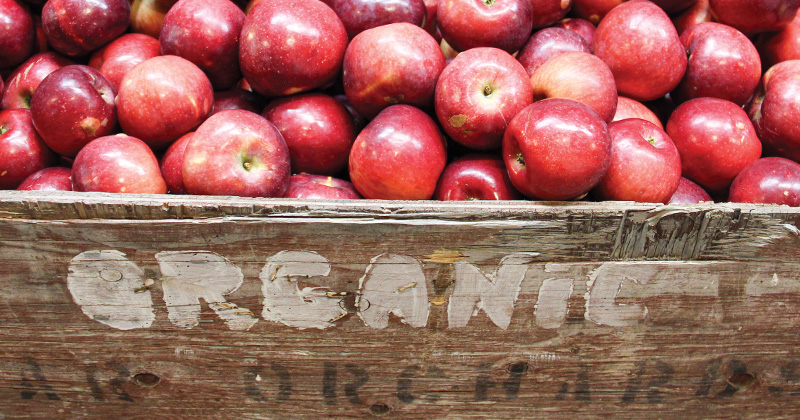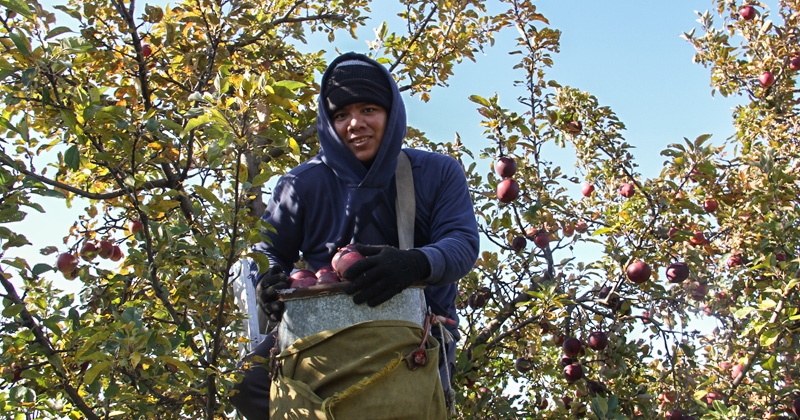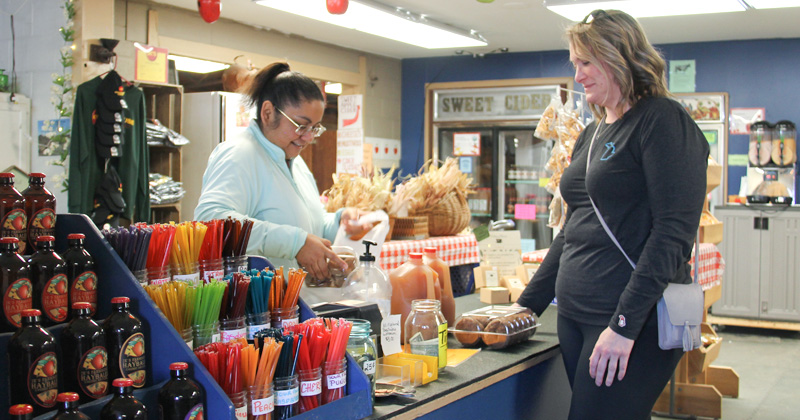
Almar Orchards takes apple eating personally.
“We know our apples are going into lunch boxes and being used to make applesauce and pies and snacks. So, it’s really important to our family that we produce apples that are always healthy and wholesome,” said Monique Lapinski, who helps run her family’s 150-year-old Flushing farm.
It’s that concern for the health of his own children and others’ that prompted Lapinski’s father, Jim Koan, to forego traditional pesticides and herbicides in favor of organic and sustainable practices 25 years ago.
Today, Almar Orchards is Michigan’s largest USDA-certified organic apple farm — and one of the biggest organic apple orchards in the Midwest. Half of its 300 acres now consists of organic apples and, more recently, pears.

The family’s organic agricultural production choices are designed to minimize negative environmental impact to their land, improve the quality of life for everything living near it, and leave it a better place than when they found it.
“Half of our focus is to produce food that has the least amount of impurities for human consumption,” said Jim Koan, 75, who owns the farm with his wife, Karen, and two of their children, Zach Koan and Lapinski. “The other half is to minimally impact the environment.”
The farm has been in the same family since before the Civil War when Jim Koan’s great-great grandfather emigrated from Canada and bought a Flushing orchard in the mid-1800s. Almar Orchards, located at 1431 Duffield Road, is named for Jim Koan’s parents, Albert and Mary.
In 1971, Jim Koan left teaching to return full time to the farm and become a full partner in the business. Knowing his five kids would spend their childhood on the farm, it bothered Jim Koan to expose them to dangerous pesticides and herbicides.
But giving up synthetic chemicals is risky business; apples are highly susceptible to disease and insects, Lapinski said.
So, Jim Koan began using non-synthetic pesticides and trying new techniques like mating disruption and integrated pest management. He’s used pigs to eat fallen apples to combat invasive insects as well as other non-toxic methods to battle contagious diseases.
As a result, Jim Koan has become a leader in the science of organic orchard management, welcoming farmers, scientists, and university researchers interested in sustainable agriculture to his Flushing farm.
“He was one of the most innovative growers I’ve worked with in terms of being willing to try something, to allow us to do research on his farm, and show others how to do things,” said David Epstein, a retired U.S. Department of Agriculture entomologist.
In Michigan, apples are the largest and most valuable fruit crop. Growers operate 775 family-run farms on 31,500 apple-bearing acres. There are 24 organic apple growers in the Great Lakes State comprising just 630 acres.
Jim Koan – who served nearly 20 years on the Michigan Apple Research Subcommittee – has long been dedicated to bringing research and innovation to Michigan apple growers, said Diane Smith, executive director of the Michigan Apple Committee.
“While organic production is only a small part of apple production in our state, it continues to grow, and the Koan family has been integral to that movement in our state,” Smith said.
Today, the Koans grow nearly 50 apple varieties and hope to harvest close to 30,000 bushels this year.
Their farm store is open year-round and is a cross between an old-fashioned apple stand and a millennial’s organic market. Organic apples are the stars of the show, with only the best eating and cooking apples offered for sale. Almar also offers fresh cider, dried apples, vinegar, honey, maple syrup, and donuts.

Cider has played an important role in the ongoing history of Almar Orchards. The sale of cider saved the farm during the Great Depression when people came from far and wide during Prohibition for their “Special Farm Cider,” Lapinski said.
In the early 2000s, Lapinski worked with her dad on getting back into the hard cider business. After experimenting in the family kitchen to perfect the recipe, they started a second company called JK’s Farmhouse Ciders. These award-winning, farmhouse hard ciders are popular at the farm store and select flavors are available across Michigan and nationwide.
“After the harvest, we press our organic apples and allow them to slowly ferment for up to six months,” said Zach Koan, who manages the hard cider operation. “We then carefully hand fill and label each bottle and let it age for several weeks using our traditional family recipe.”
Their biggest seller is JK’s Scrumpy, a slowly fermented hard cider made from organic apples and natural yeast. They also offer an “energy” drink, Haybaler Switchel, and seven standard hard cider flavors in bottles and/or cans and growlers.
Hard cider and Haybaler tastings are available at the farm store, along with a variety of bottles, cans, and growlers.
Although competition is stiff now in the world of hard cider, JK’s Scrumpy is consistently a big seller.
“You’d be hard-pressed to find better organic hard cider out there,” Lapinski said


Looking forward, the Koans are committed to growing their organic apple operation in the coming generations despite the costs and challenges.
According to Lapinski, organic practices are more labor intensive because there’s less reliance on chemicals. The organic products that are used are more expensive and have to be applied more often in the orchards because of their reduced potency. Organic certification requires more paperwork, and there’s an additional cost involved in the annual certification process. And, while mass-production reduces costs, organic fruits and vegetables are typically produced on a smaller scale on small family farms like Almar Orchards.
But that’s OK with the Koans.
“We choose to do it this way,” Lapinski said. “We make a conscious effort to protect our customers and to protect the environment. It’s hard, it’s expensive … but we really believe that it’s important.”
